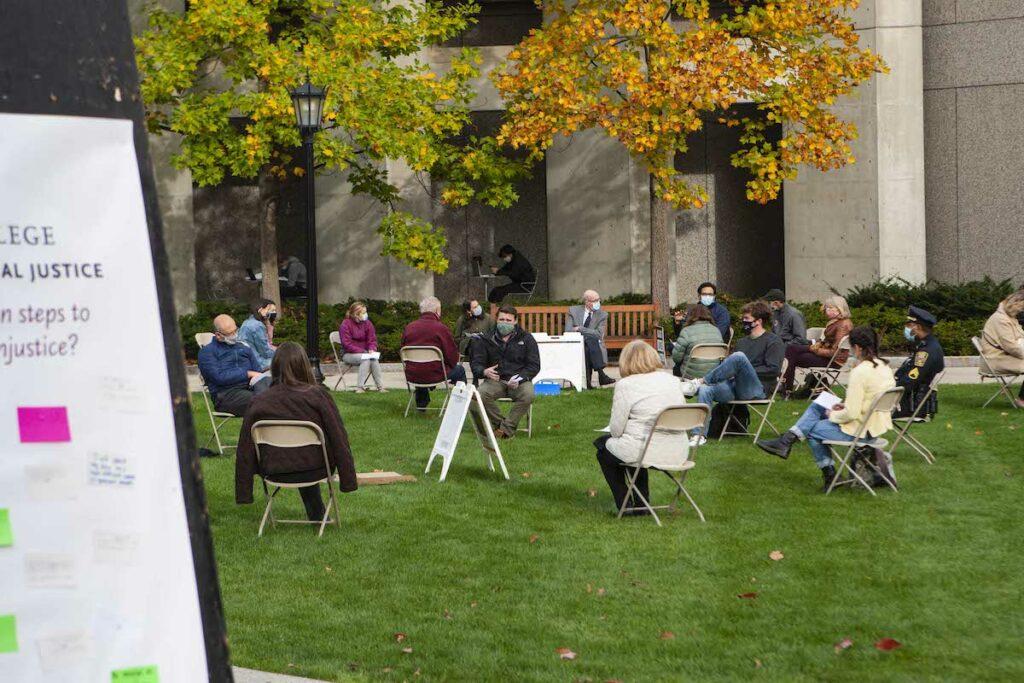“This is a collaborative effort,” said Chinenye Ugocha, director of UGBC’s AHANA+ Leadership Council and MCAS ’21. “Issues of racism, discrimination, and prejudice don’t exclusively pertain to the AHANA+ community. They’re issues that should pertain to all members of the BC community.”
Over 50 students, faculty, and staff gathered on O’Neill Plaza to attend “Solidarity for Racial Justice,” an event that featured speeches from BC community members and conversation circles, and concluded with a Solidarity Walk around the BC campus.
The event, which was hosted by the BC Forum on Racial Justice in America and the Division of Student Affairs, marked the conclusion of the forum’s series of opening events, which kicked off Oct. 7.
Associate Vice President of Student Engagement and Formation Tom Mogan said that the solidarity event was geared toward engaging student organizations into the forum’s anti-racist work.
“The Solidarity for Racial Justice event was designed to provide an in-person experience to demonstrate support for racial justice and to do so in a safe and meaningful way,” Mogan said in an email to The Heights.
Mogan emphasized the “dual pandemic” facing American society in his opening remarks at the event.
“We come together today in the midst of the dual pandemic that has wracked our society in the last several months—that of COVID-19 and that of racial injustice,” Mogan said. “And we come together today amidst this, for us to realize that this work is not done. Work of racial justice must continue.”
Dean of Morrissey College of Arts and Sciences Greg Kalscheur said that solidarity is a necessary component for ending racism.
“If we’re going to work for racial justice, if we’re going to end racism, we have to be attentive to what’s happening, how people are affected by what we say and do … taking responsibility for one another, so that we can all flourish in community,” Kalscheur said. “That’s what solidarity is about.”
Milvia Sanchez, associate director of human resources at Information Technology Services, spoke about ITS’s responsibility to actively combat racism and strive toward equity for all.
“Our success comes from inclusion of a diverse workforce, which in turn provides a rich diversity of opinions and solutions to the work that we do for all of you,” Sanchez said. “Our commitment to help eliminate racism is to continue to improve our diversity, equity, and inclusion efforts in our department, raise awareness on racial injustice, to keep learning because it’s important to have an open mind, and to keep the conversation going.”
Associate Vice President for Mission and Ministry Rev. Tony Penna, S.J., said that anti-racism requires personal changes, and he has been inspired by the community to make those changes.
“I have followed many of you on this campus as you have courageously stood up for anti-racism on this campus,” Penna said. “And I followed you and I’ve been inspired by you to do my own work.”
Ugocha urged her peers to continue to stand in active support of racial justice and inclusion.
“I invite all students and leaders on campus to challenge yourselves in vacating your comfort zone and strive to find comfort in an environment that is inclusive of all,” Ugocha said. “Be an advocate that ensures your Black and brown friends and peers feel safe and supported always, especially during challenging and stressful times. Their concerns have fallen on deaf ears.”
Students, faculty, and staff were then divided into socially distanced conversation circles and challenged to identify those on campus with privilege, those most impacted by systemic racism, and ways to promote inclusion on campus.
“In regards to BC, students of color have given [the BC community] plenty of ideas that they just simply have to follow through on,” said Sasha Severino, a member of ALC and MCAS ’21.
Following the Solidarity Walk, attendees were encouraged to fill out a commitment card, pledging one action they would take to eliminate racial injustice. These cards were posted on large boards outside O’Neill Library as a reminder that the fight for racial justice must continue at BC.
“I think it’s really good hearing other people’s opinions and how they envision fighting racism, and then working together to make that come true,” said Nicole Wei, a member of BC Asian Caucus and MCAS ’23.
“In general, I would like to see more students engaged in stepping outside of their comfort zones and attending events and discussions that focus on diversity, inclusion, and racial justice,” Mogan said in the email. “The Solidarity for Racial Justice event was one step towards asking people to commit to at least one action step to further the cause of racial justice.”
Featured Image by Ikram Ali / Heights Editor













